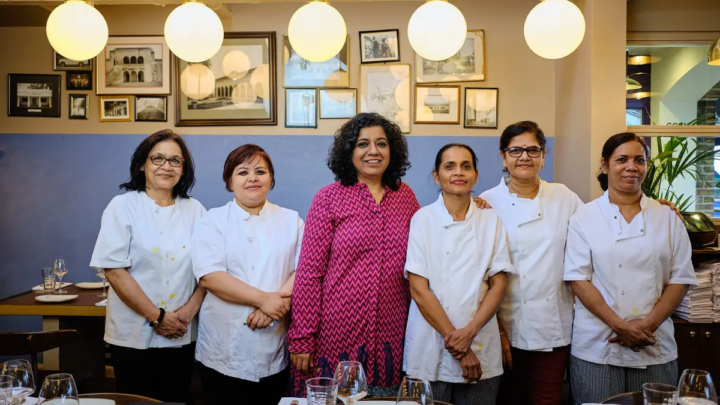10/05/2024
The Changing Culture in British Restaurant Kitchens: Why Wellbeing Matters
For Mental Health Awareness Week (13-19 May 2024) Ambassador of Women In the Food Industry and Writer, Antonia Lloyd, talks to the Women Head Chefs making waves in their restaurant kitchens and why wellbeing matters.
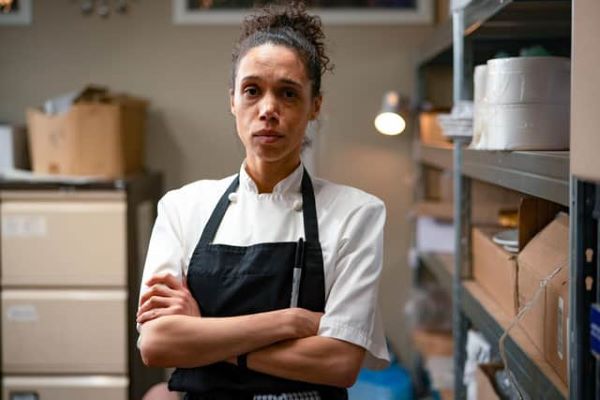
Vinette Robinson in BBC’s Boiling Point
British restaurant kitchens continue to be dramatized as highly stressful work environments as anyone who has seen the film Boiling Point (2021) starring Stephen Graham and its more recent BBC spin off TV series (2023) will recall: Head Chef Carly, played by Vinette Robinson, struggles to keep her new restaurant Point North on track in the face of spiralling energy and food costs while those around her battle with the cost of living crisis, addiction and serious mental health issues.
Over the pond there’s Emmy award-winning The Bear, going into its third season, to add to this high-octane cheffing drama genre. These are tense and uncomfortable to watch and highlight the pressures facing those in the hospitality industry. For many professional chefs, these series are traumatic to view, especially when you consider that four out of five hospitality professionals report having experienced a mental health issue during their career.
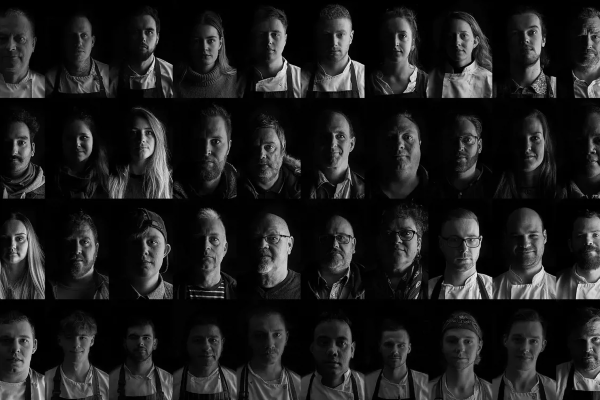
Image from The Burnt Chef Project
While supply and energy costs remain huge pressures for the UK hospitality industry, there are obvious signs of a cultural shift in how to approach mental health challenges. Over the last five years Founder and CEO Kris Hall of The Burnt Chef Project has been challenging the stigma of mental health, training and educating industry professionals across the globe to create a more sustainable, compassionate workplace: “Whilst there’s still a huge amount of work to be done, we’re seeing wellbeing being taken far more seriously by senior management – healthy, happy and valued teams are without doubt the key to a sustainable hospitality industry.”
![]()
![]()
![]()
![]()

A major challenge, historically, has been the expectation that the industry demanded excessively long working hours from its employees. Roberta Hall-McCarron, Chef and Co-Owner of acclaimed The Little Chartroom, Eleanore, and now opening a third restaurant, Ardfern, in Edinburgh admits: ‘My average week used to hover around 80 hours, we have just moved all our teams on to either 45- or 50-hour contracts. I used to think that I was absolutely fine working that many hours, but looking back I was exhausted, and definitely wasn’t working to the best of my ability, more mistakes were made, and I was constantly burnt out.’
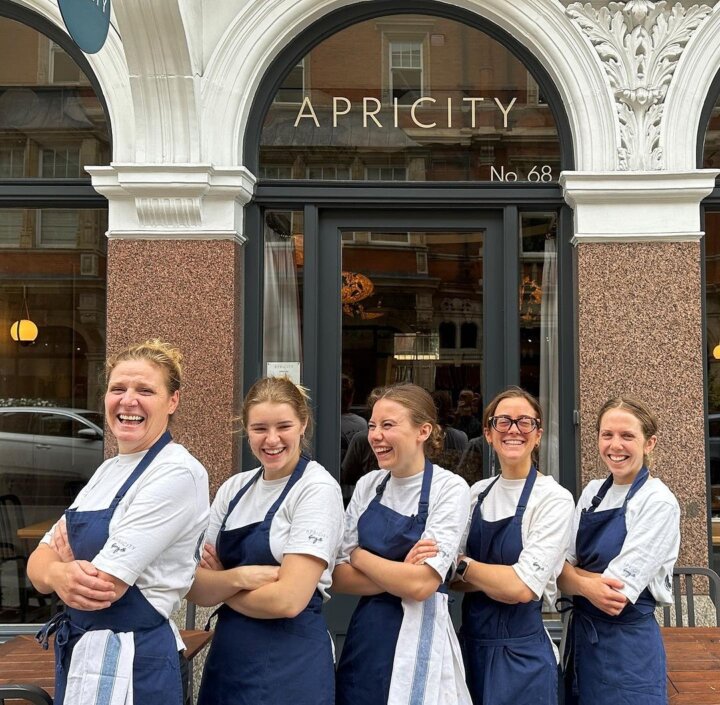
Green Michelin starred chef Chantelle Nicholson at Apricity had a similar experience: ‘There were many things that were just accepted as being the norm such as working a lot more hours than you were paid for, needing to cover when others were on holiday or sick, again with no extra pay. Holidays and day off requests were pretty much frowned upon.’ Chantelle now approaches her kitchen culture very differently: ‘I made a conscious decision that I needed to change things, rather than just accept things as the norm.’ Instead of time off being a sin, ‘holidays are encouraged to be taken and there’s flexibility week to week. Requests for certain days off are always tried to be accommodated. We do not start early, and we don’t finish late, to ensure everyone has a good amount of time to rest between each shift.’
Chantelle Nicholson describes her kitchen culture as ‘nurturing’ and ‘inspiring’ which she admits may not be the case in every kitchen.
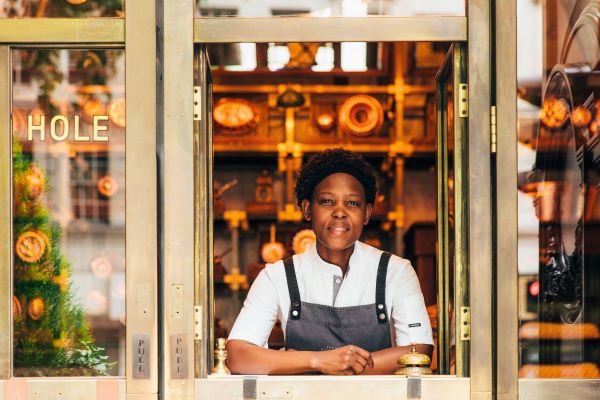
Nokx Majozi, Head Chef at The Pie Room, Holborn Dining Room, describes her kitchen culture as ‘like a family,’ and the reason that she has stayed for so long. ‘It is the first time in a job that when I have to collect my daughter, they gave me flexible hours. It is the first time that someone cares for both my work and my family.’ She admits that this is the only place she has managed to find a good work-life balance since arriving in the UK over twenty years ago.
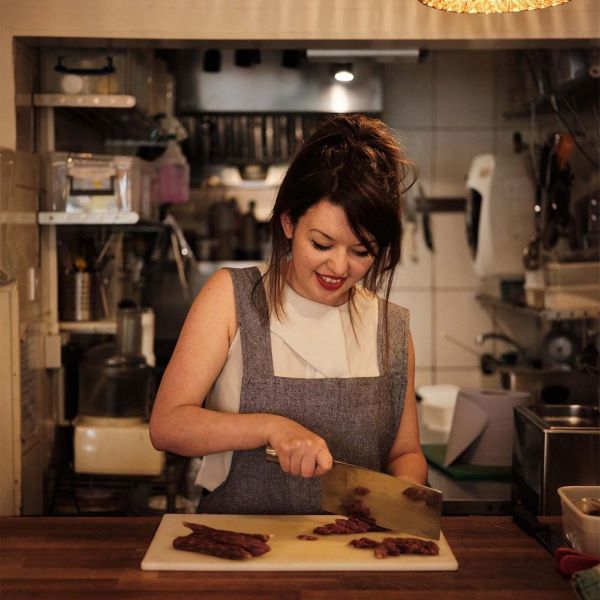
Photo by Liz Seabrook
Frankly speaking, the reputation of restaurant kitchens, over the last twenty years, hasn’t been good: male dominated, shouty and unsafe have been the best way to describe them– from the ritual bullying and humiliation depicted on ITV’s Hell’s Kitchen and Channel 4’s Ramsay’s Kitchen Nightmares, to painful testimony from chefs hurt with hot pans, denied medical treatment during service, and experiencing verbal and physical assault. Roberta McCarron-Hall was once grabbed on her bum by a male chef: ‘I called him out on it, he denied doing it and it never happened again to me in that kitchen or any other, but that sort of culture was apparent in a lot of places.’ Julie Lin, Chef and Owner of GaGa in Glasgow, trained in classical techniques under Laurie MacMillan but on her days off, she described the toxic culture as ‘medieval’: ‘It was like stepping back into the dark ages.’
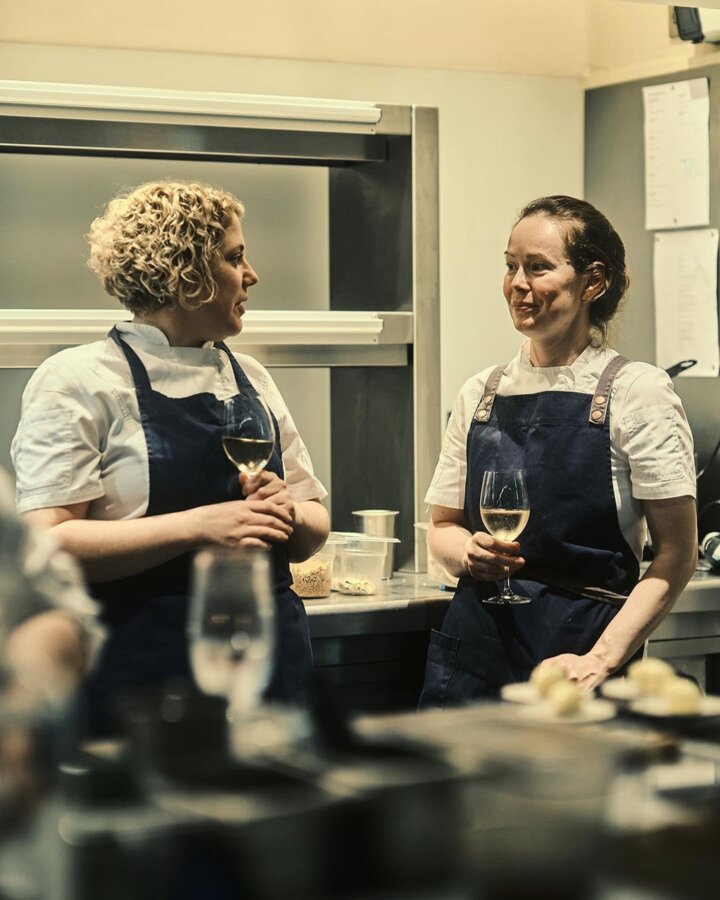
Photo of Sally Abe & Roberta Hall by Sam Christie – Awayemedia
Now, the story is starting to change with respect and wellbeing of staff reported as being incredibly important. Roberta says, ‘I worked in quite a few kitchens that had a lot of ‘shouty, high ego chefs’ and this is something that I don’t condone at all. There is zero tolerance for that kind of behaviour. Mistakes are made and addressed, but in a much calmer way.’
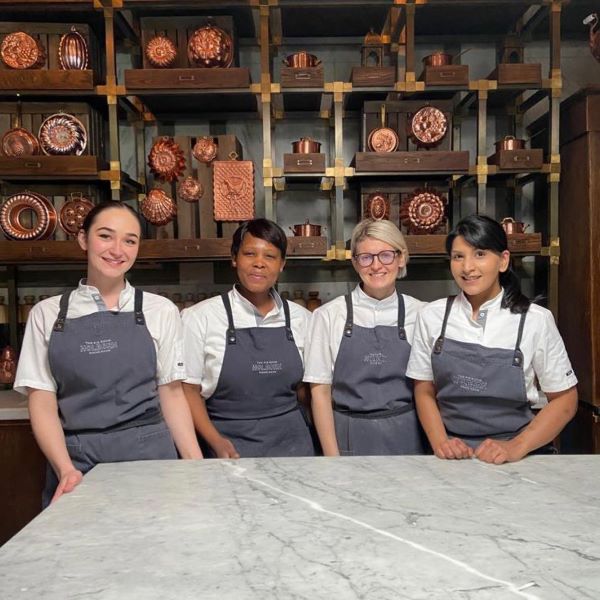
Nokx Majozi at The Pie Room runs a team of twenty-three chefs and operates a zero tolerance to shouting in the kitchen: ‘There is so much respect in this kitchen.’ Nokx also puts time into her staff’s wellbeing with one-on-one monthly catch ups: ‘It’s very important to know each member of your team. Ask them, “How’s the family?” or maybe they live alone, maybe their mum or dad are sick, ask them how we can help them.’
Nokx Majozi says ‘there were zero women when I came to the UK (in 2001), it was hard, hard, hard.’ She now has over 40% women in her kitchen at The Pie Room including other working mothers.

Kim Ratcharoen, Head Chef at three Michelin starred Restaurant Gordon Ramsay, agrees that wellbeing is a hot topic right now:’ I think it’s important to make sure your team is healthy mentally and also even physically.’ There are discounted gym memberships for the team, they provide healthy meals at work, and ‘I always say to them, make sure you rest on the weekend. I sound like a like a mum sometimes.’ When it comes to more serious issues, there’s a clear go-to for the industry: ‘If my guys need any advice or help,’ says Kim, ‘I would always direct them to the Burnt Chef project.’ CEO Kris Hall’s initiative has reached over one hundred and twenty countries worldwide with free education and training support, and thousands of hospitality workers have turned to the helpline, akin to a lifeline for some, manned by counsellors and clinically trained psychotherapists.
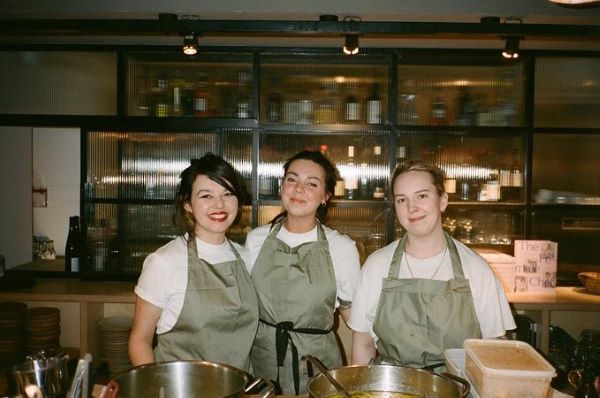
Photo by Liz Seabrook
Another challenge for the hospitality industry has been the chef brigade system which is ripe for abuse. This hierarchical structure first introduced by Escoffier in the 19th century based on his time in the French army is still used in many fine dining establishments in the UK. Speaking to women chefs at the top of their game, they are determined to challenge it. Julie Lin considers the military system overly regimented: ‘I don’t think it creates a very democratic kitchen.’ In her Malaysian Scottish restaurant GaGa with 120 covers, she prefers to follow a more Asian family-run approach: ‘In Asia you get kitchens that are run by so many people but everyone’s of a similar level. You’re just doing a different job in the kitchen that day.’ Julie also chooses not to use the French brigade terms: ‘I do have a kitchen manager and supervisor, but we keep away from the terms of chef de partie.’ This as much about respecting other cultures within the kitchen and other cuisines, ‘you don’t necessarily have to call them all these names, the same French names.’
Roberta McCarron-Hall takes a similar path in Edinburgh, having a head chef and sous chef, but everyone else is on the same level: ‘We have no commis chefs or chef de parties. Having less of a hierarchy encourages everyone to take responsibility and ownership for their work and look out for one another. The team swap sections regularly so that they can understand everything but also as we are a seven-day operation it’s important that everyone can slot in seamlessly.’

By contrast, Head Chef Kim Ratcharoen at three Michelin starred Restaurant Gordon Ramsay, embraces the brigade system, ‘of course we’re trying to change the same as every other restaurant in our industry, but we still want to keep the structure, the discipline and the organisation is still the same.’ However, her approach is more geared towards the individual: ‘I was always taught that it was ‘sink or swim’ which worked for me. Now with this generation it’s completely different -individually, someone needs more nurturing, someone can just grow by learning. So, I think you need to take each individual chef differently as well.’ For a sustainable industry, the message is becoming clear: training, respect and valuing the individual are key to success.
For women chefs who still only represent 6% at the elite Michelin end and less than 1 in 5 across the UK’s restaurant industry, wellbeing is more complex than just closing the gender gap. Positive, visible women chefs are also critical: Asma Khan, recently voted in the Time Magazine’s top 100 list of most influential people, renowned for her socially enterprising women-only kitchen at Darjeeling Express; Clare Smyth, the new UK’s President of Bocuse D’Or and the only 3 Michelin starred British chef at her eponymous restaurant Core; Sally Abe of The Pem, among CODE’s 100 Most Influential Women in Hospitality 2022 and Women of the Year 2023; and this year’s newest star Nigerian chef Adejoke Bakare, the first British black woman to be awarded a Michelin star for her modern West African restaurant Chishuru. Inspiring women chefs who also juggle motherhood like Lisa Goodwin-Allen and Monica Galetti are also key role models. It is hard to underestimate the significance of these visible trailblazers for any women coming up the ranks today.
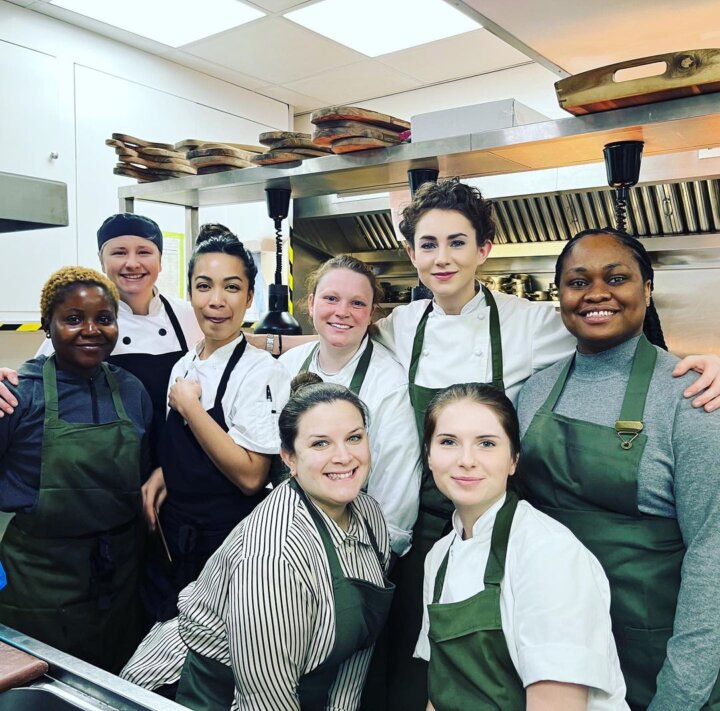
Ruth Hansom who runs Hansom, a 16-seater restaurant in Yorkshire, was one of only a tiny percentage at The Ritz when she started there in 2013: ‘There was one other woman in the hot section in a team of fifty chefs, the rest were in pastry. Now there are eight.’
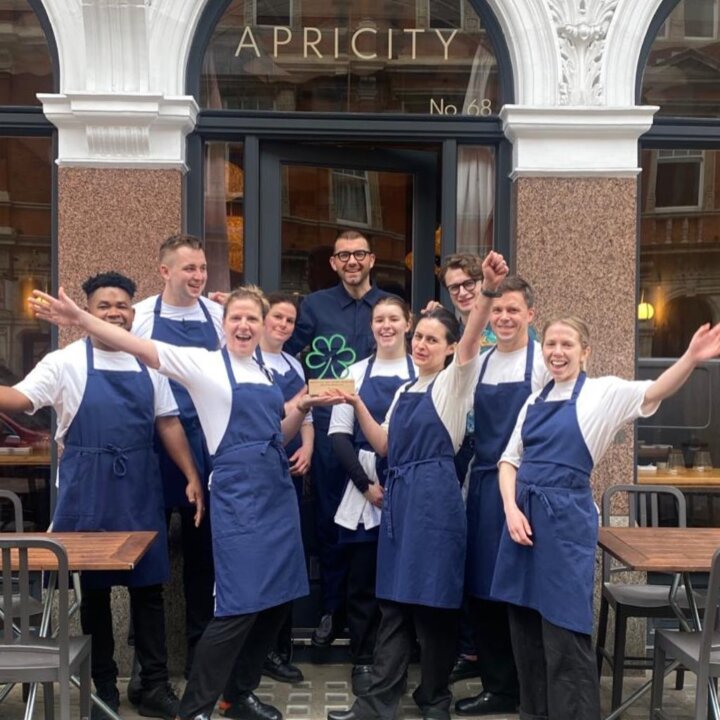
At the other end of the spectrum Chantelle Nicholson has a staggeringly high 87% women in her kitchen at Apricity which she emphasises has happened organically, but she accepts it is a bubble in the industry. For Roberta in Edinburgh, ‘It’s important to me to have women in my kitchens but it’s also important that I have the best chefs available to me and sometimes it just depends on who applies at any given time. I do truly believe that kitchens are changing, and it is getting fairer for women to rise through the ranks, and with more role models, the percentage of woman applying should increase.’
In Mental Health Awareness week, we must celebrate the positive steps revolutionising this industry: a greater awareness of wellbeing and support for mental health challenges, more flexible hours and respect for the individual, and wherever possible and practical, less of an emphasis on the hierarchical chef brigade structure. As Chantelle says: ‘The industry has the ability to change the culture of kitchens, and it has a responsibility to do so to ensure a diverse, and better future.’
You may also like to read Antonia’s feature with Michelin Green Star Chef Chantelle Nicholson, and our Round up of our Sustainability, Equality & Heritage Panel.

